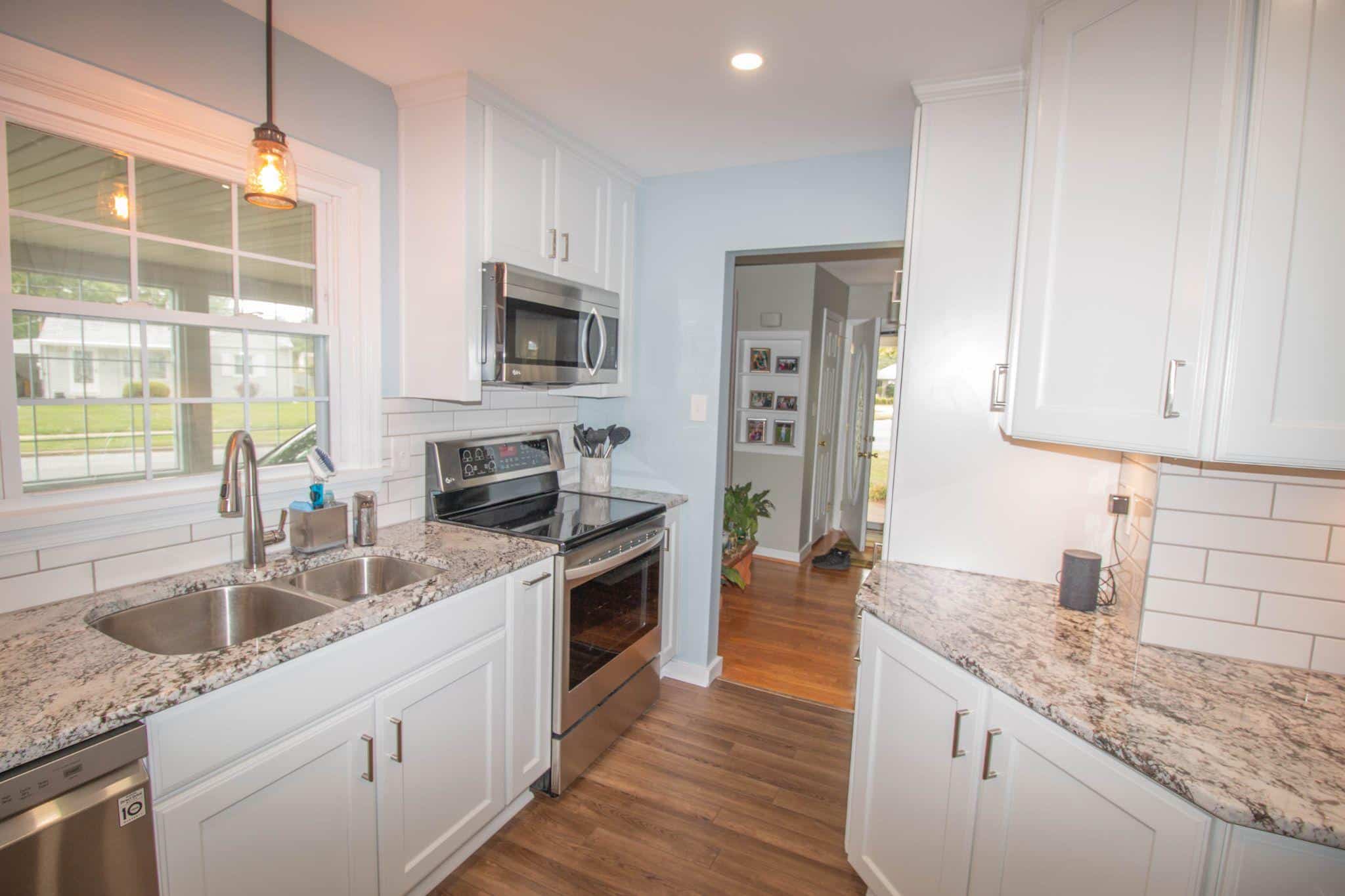Thinking about upgrading your kitchen or bathroom countertops? Porcelain countertops have become a popular choice for homeowners seeking modern, durable surfaces. But are they right for your home?
These sleek countertops offer impressive benefits, including scratch resistance, easy maintenance, and stunning design options that mimic the look of natural stone. However, they also come with drawbacks, including high costs, installation challenges, and susceptibility to chipping.
Making the wrong countertop choice can cost thousands in replacement expenses. That’s why understanding both the advantages and disadvantages is crucial before you make an investment.
This guide provides a comprehensive overview of everything you need to know about porcelain countertops. We’ll cover their durability and maintenance requirements. By the end, you’ll know whether porcelain countertops are a good fit for your budget, lifestyle, and design goals.
Ready to make an informed decision? Let’s examine the complete picture.
What Are Porcelain Countertops?
Porcelain countertops are surfaces made from fine clay and natural minerals that are heated at extremely high temperatures to create a dense, hard material.
The manufacturing process involves pressing clay particles under intense pressure, then firing them at over 2,000 degrees Fahrenheit to form ultra-thin slabs.
These countertops first gained popularity in Europe during the early 2000s and entered the American market around 2010 as homeowners sought alternatives to natural stone.
Today, porcelain countertops are commonly installed in kitchens as work surfaces, bathroom vanities, and even outdoor cooking areas due to their versatility and modern appearance.
Pros of Porcelain Countertops
Porcelain countertops are durable, heat-resistant, low-maintenance, and offer a wide variety of design options, making them a practical and stylish choice for modern kitchens and bathrooms.
1. Durability
Porcelain countertops resist scratches from knives and cooking utensils better than most materials. They can handle hot pans up to 570°F without cracking or discoloring.
These surfaces also repel stains from wine, coffee, and acidic foods. With proper care, porcelain countertops can last 50+ years, outlasting many other counter materials.
2. Low Maintenance
The non-porous surface blocks bacteria, mold, and mildew from growing in tiny cracks. Daily cleaning requires only warm water and mild soap – no special cleaners needed.
You won’t need to seal or wax these countertops like you would with natural stone. This saves time and money on maintenance costs over the years.
3. Visually Versatile
Porcelain comes in dozens of colors, from pure white to deep black and everything between. Modern printing technology enables the creation of realistic marble, granite, and wood grain patterns.
The smooth or textured finishes work well in contemporary kitchens and traditional homes. You can match any design style with the right choice of porcelain.
4. Environmentally Friendly
These countertops are crafted from natural clay and minerals, free from harmful chemicals. At the end of their life, porcelain can be recycled into new products.
The manufacturing process uses less energy than producing synthetic materials, such as solid surface counters. This makes porcelain a more environmentally friendly choice for eco-conscious homeowners.
5. Heat and UV Resistance
Porcelain won’t crack or warp when exposed to high cooking temperatures. Unlike some materials, it doesn’t fade or change color in direct sunlight.
This makes it perfect for outdoor kitchens and bright indoor spaces. The color stays true for decades without yellowing or dulling.
6. Waterproof
The dense, non-porous surface prevents water from seeping into the material. This stops stains from setting in and bacteria from growing inside the counter.
Spills sit on top of the surface for easy cleanup. The waterproof nature also prevents damage from humidity in bathrooms and kitchens.
Cons of Porcelain Countertops
Porcelain countertops can be expensive, prone to chipping or cracking, require professional installation, and are difficult to repair if damaged.
1. Cost
Porcelain countertops cost $60-$100 per square foot, much higher than laminate at $10-$40. The material itself is expensive, and you’ll pay extra for specialized installation tools.
Transport requires careful handling to prevent damage, which can add to delivery costs. The total project cost often doubles that of basic counter materials.
2. Susceptible to Chipping and Cracking
Heavy pots, appliances, or tools can chip the edges when dropped. The thin material (usually 6-12mm) is more fragile than thick granite slabs.
Corner edges are especially weak points that crack under impact. Once damaged, the white core becomes visible through colored surfaces, making chips highly noticeable.
3. Complex Installation
Only trained professionals can install porcelain countertops safely due to their fragile nature. The installation process takes 2-3 days compared to 1 day for other materials.
Special diamond-tipped tools are needed to cut precise holes and edges. Any mistakes during installation can crack the entire slab, requiring replacement.
4. Limited Repair Options
Small chips can sometimes be filled with matching epoxy, but repairs are often visible. Cracks cannot be fixed and typically spread over time with use.
Unlike granite or quartz, scratches or damage can’t be sanded down or polished out. Most damage means replacing the entire counter section, which is expensive.
5. Weight
Porcelain slabs weigh 13-15 pounds per square foot, requiring reinforced cabinets. Standard kitchen cabinets may need additional support brackets before installation.
Moving large slabs requires special equipment and multiple workers. The weight makes DIY installation impossible for most homeowners.
6. Cold and Noisy Surface
Porcelain stays cool to the touch, which can be uncomfortable in winter months. Dropping dishes or utensils creates loud sounds that echo through the kitchen.
The hard surface amplifies noise more than wood or composite materials. This can be uncomfortable in open-plan homes or when cooking early in the morning.
Porcelain Countertops vs. Other Materials

| Factor | Porcelain | Granite | Quartz | Marble |
|---|---|---|---|---|
| Durability | Very durable | Very durable | Durable | Durable |
| Cost | Mid-high | Expensive | Mid-high | Very expensive |
| Aesthetic | Versatile | Natural patterns | Engineered designs | Elegant veining |
| Maintenance | Low, easy to clean | Requires sealing | Low, easy to clean | Needs sealing |
| Heat Resistance | Excellent | Excellent | Good | Poor |
| Scratch Resistance | High | High | Moderate | Low |
| Environmental | Eco-friendly | Natural, energy-intensive | Less eco-friendly | Natural, impactful |
Should You Choose Porcelain Countertops?
Porcelain countertops are ideal for homeowners with larger budgets who seek low-maintenance, modern surfaces that last for decades.
Consider them if you cook frequently, need heat-resistant surfaces, or prefer the look of natural stone without the upkeep. They’re ideal for busy families who want easy cleanup and are willing to accept the higher upfront cost.
However, choose other materials if you’re on a tight budget, do heavy kitchen work that might cause chips, or prefer warmer surface materials.
Porcelain suits design-focused homeowners who prioritize style and durability over initial cost savings.
Summing It Up
Porcelain countertops offer a compelling mix of durability, low maintenance, and stunning design options that can change your kitchen or bathroom.
Their scratch resistance, heat tolerance, and waterproof nature make them practical for busy households.
However, the high upfront costs, complex installation, and risk of chipping aren’t suitable for every homeowner. The investment makes sense if you prioritize long-term value and modern style over initial savings.
Consider your budget, cooking habits, and design preferences carefully. If you can afford the higher cost and want a low-maintenance surface that lasts for decades, porcelain could be the perfect choice.
Before making your final decision, get quotes from certified installers and see porcelain samples in person. The right countertop choice depends on your specific needs and lifestyle.
What’s your next step in choosing the perfect countertop for your home?
Frequently Asked Questions
Which Is Better, Quartz or Porcelain Countertops?
Quartz is more durable and chip-resistant, while porcelain offers better heat resistance and a wider range of design options at a similar price point.
Do Porcelain Countertops Crack Easily?
No, porcelain countertops are durable for daily use, but they can crack if heavy objects are dropped on them or if installation is improper.
What Are the Disadvantages of Porcelain Material?
High cost, susceptible to chipping, requires professional installation, has limited repair options, is heavyweight, and creates a cold, noisy surface.
Will Porcelain Countertops Chip?
Yes, porcelain countertops can chip when heavy objects are dropped on their edges or corners, and these chips can be challenging to repair invisibly.










